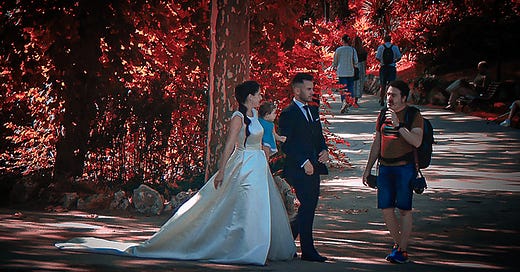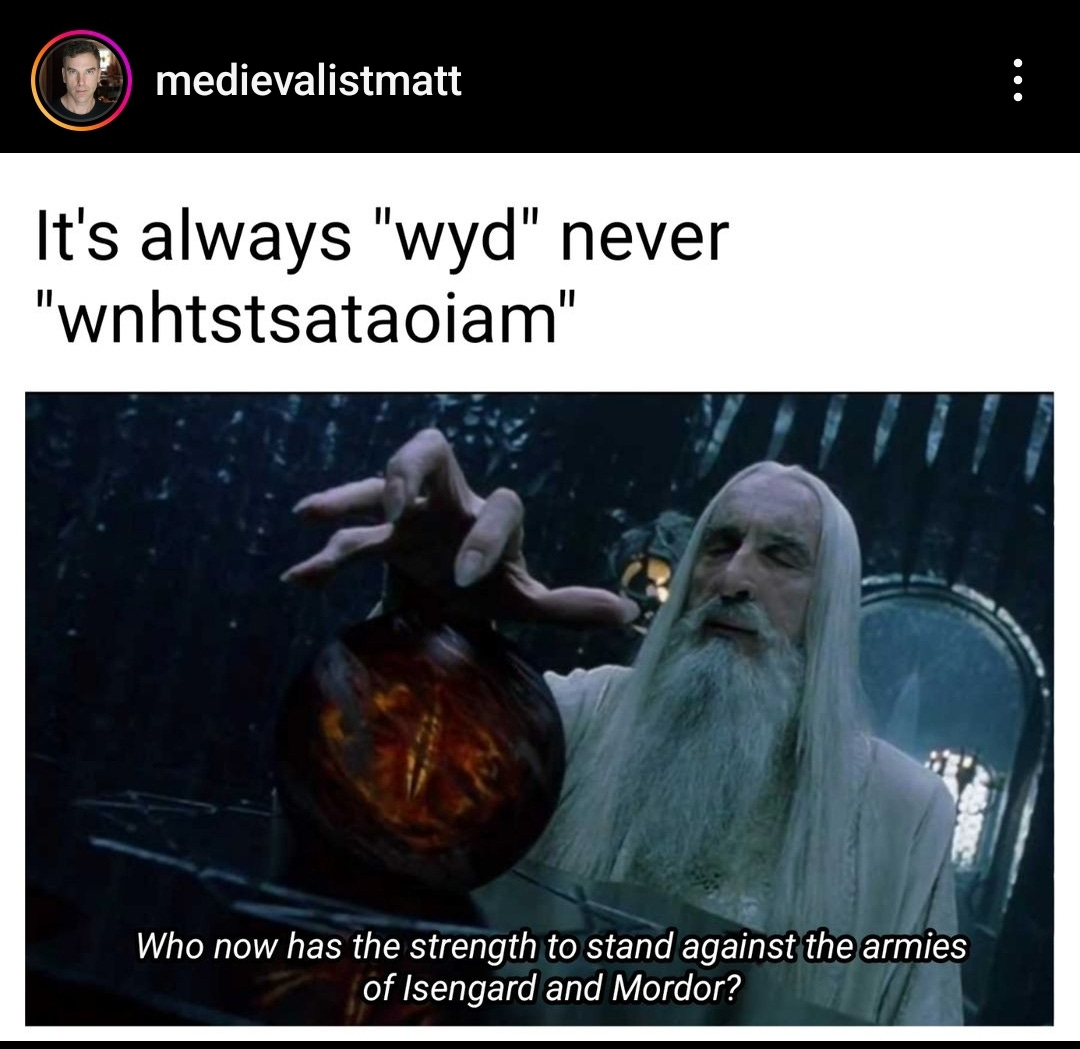Winnie the Pooh with swords fighting vibes-based Bad Men: February 2024 Essay Recommendations
The dark state of fantasy, the truth about marriage, and why The New York Times is kinda messy right now.
While February has been a month of planning various writing projects but not writing very much at all, it has also been a month of immensely stimulating reading. Here are some of my favorite things…
the state of fantasy
In an essay for The Critic, Sebastian Milbank delivers a blistering critique of the trend toward darkness, grit, and cynicism in fantasy literature today. Sure, the old standbys like Lewis, Tolkien, and MacDonald are still looked to—but mostly because what’s published today is, spiritually and aesthetically, the polar opposite of what they wrote. Today’s fantasy is
a genre that flatters the egos of audiences who get to feel superior and sophisticated by absorbing its cynical social commentary, and at the same time covertly satisfying their most pornographic impulses…
George R.R. Martin, Breaking Bad, Joe Abercrombie, Philip Pullman, and others are guilty. Milbank’s absolutely epic piece argues that the “abandonment of teleology—the loss of the moral of the story” so evident in fantastic literature today “is poison for culture.” Exactly.
Despite fantasy writer (and sometime Tolkien contemporary) Michael Moorcock criticizing Lord of the Rings as simply Winne the Pooh with swords, Milbank argues that Tolkien got the whole point of fantasy correct. The idea is not to paint a “realistic” reflection of our grim, dark world—but did Lothlórien have a tax code? wah-wah—but to paint an aspirational image that points to capital-t Truth.
Middle Earth is a fiction of course, but the metaphysical Real with a capital “R” is more “real” than our sinful, broken, chaotic world. [Tolkien’s] imaginary universe is not about realistic political or military conflict, but an eternal, mythopoetic reality of beauty’s erasure by time and mortality; of the seemingly doomed struggle to overcome ever-recurrent evil; of moments of domestic warmth or heroic valour flashing bright in the night of existence. In other words, like all good fiction, it’s not factual, but it is real.
Read Grimdull.
And while I’m on this literature trip…
Check out Adam Kotso’s argument that ‘large-scale prose writing is the best medium we have for capturing the complexity of history, identity, fears, and desires, and the education system should not be in the business of keeping students from learning how to engage effectively with it’. I agree.
People are fighting to renormalize teaching kids how to read with phonics instead of “vibes-based literacy” curriculum — Jessica Winter had a lengthy report in The New Yorker a few years ago.
facts about marriage
I know we live in a super-liberated society where everything old and traditional is terrible, and we just have to find new ways to do things. But sometimes—sometimes—we gotta admit that the old ways have their advantages. Brad Wilcox argues this brilliantly in his essay, The Awfulness of Elite Hypocrisy on Marriage.
He points out that all the cultural elites and progressive liberals who champion alternative family structures as just as good as a traditional family structure (a mom, dad, and some kids), somehow seem to always opt for…you guessed it, the traditional nuclear family structure. Funny that, innit? “On family matters, they ‘talk left’ but ‘walk right’—an unusual form of hypocrisy that, however well intended, contributes to American inequality, increases misery, and borders on the immoral.”
I know it’s not nice to say, but the numbers don’t lie. “Voluminous research shows that being born into a married, stable household confers enormous benefits on children, whether the parents are rich or poor.”
And while we’re talking about marriage…
Check out
’s essay, In Praise of Heteronormative Love SongsAnd Esau McCaulley’s When Valentine’s Day Meets Ash Wednesday
different kind of culture war
There’s a culture war coming, but not the kind you think.
, in yet another insightful piece, reveals how the macroculture—the media structures defined by network television, cable news, newspaper companies, and even giant tech and social media companies—“has forgotten how to maneuver” and will soon be taken over by the microculture. (Or should that be microcultures?)news and pews
In a New York Times op-ed, Ross Douthat draws a curious parallel between the decline of participation in organized religion in America and the declining fortunes of major media outfits.
I think there might be an interesting similarity between the media’s current trajectory and the unfolding fate of American religion. Like the legacy media, institutional Christianity in America is facing serious disruption, with formerly powerful religious bodies losing members and influence at an accelerating pace. And as with journalism’s challenges, the emptying of American churches has prompted a lot of anxiety about the implications of the trend and what to do about it — along with a lot of indifference, shading into schadenfreude, among those who think that either the mainstream press or the country’s major churches deserved a reckoning.
What the News and the Pews Have in Common — this had not occured to me.
And not to dog the NYT or anything, but…
- caught the Grey Lady red-handed changing a banal, fact-based headline about student loan forgiveness into something sinister, biased, and politicized. The problem with the U.S. news media landscape in a nutshell.
Adam Rubenstein, ex-NYT editor, talks about that time he got branded as a heretic after publishing an opinion piece in the opinion section of The New York Times.
in defense of a ‘vibes-based Bad Man’
I suppose very few people pay attention to publishing industry drama, but
’s piece about mystery novel kingmaker Otto Penzler caught my eye. Despite huge contributions to mystery publishing, some people want him to shut up and go away because, well, he’s old, white, male, and has thoughts and keeps saying them out loud. Rosenfield argues that “Penzler’s status as a Bad Man is entirely vibes-based,” and uses his case to recall us to a time when people took issue with actual issues and not with the times a person happened to be born in.There was a time when it was possible to merely dislike someone, for whatever reason, without claiming that your personal animus was actually rooted in a bigger, braver struggle against oppression and isms and phobias. There was also a time when inviting a man to speak at a conference in his chosen field was understood as a narrow acknowledgment of that man’s achievements and expertise, rather than an endorsement by the organisers of his every opinion. Perhaps most important, there was a time when reasonable people would have agreed that if you are still citing the less-than-articulate comment someone made to a newspaper 33 years ago as a top 10 reason to destroy his reputation, you are engaged not in the advancement of social justice but a bizarre personal vendetta.
I love common sense! Read: In defence of grumpy old men: The publishing world needs cantankerous codgers
something fun!
This particular Roundup edition seems lacking in fun, cool reads. Everything’s so heavy and grimdull. But I did read and love
’ ‘Oppenheimer’ is for Gossips and Haters. Because, well, it kinda is.Cheers to you and yours!









